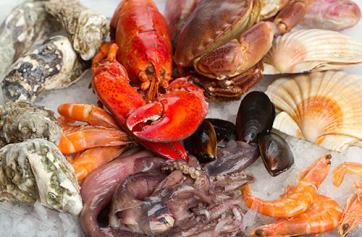 It is generally accepted that it is a good idea to include fish, such as salmon and flounder, that are high in omega-3, in one's diet. But what about shellfish (lobster, crab, mussels, clams, calamari, oysters, scallops etc)? While they contain less omega-3 than fin fish, shellfish are a good source of protein (especially octopus), and if you avoid breading and frying, are low in calories.
It is generally accepted that it is a good idea to include fish, such as salmon and flounder, that are high in omega-3, in one's diet. But what about shellfish (lobster, crab, mussels, clams, calamari, oysters, scallops etc)? While they contain less omega-3 than fin fish, shellfish are a good source of protein (especially octopus), and if you avoid breading and frying, are low in calories.
Other benefits of specific shellfish: Oysters are an excellent source of zinc, clams have iron and Vitamin B-12, and crustaceans are a good source of choline, a nutritient that may be good for memory and muscle control.
But, there are some negatives that shellfish lovers need to consider. Shrimp are high in cholesterol and if you are a 'cholesterol responder' (the cholesterol you eat overly impacts blood cholesterol) you might want to limit your shrimp intake. While we know that large fin fish like sword fish contain mercury, shellfish more readily absorb toxins often associates with the "red tide". Red tide is a bloom of plankton, especially dinoflagellates, that causes an usually reddish discoloration of coastal ocean waters. Certain dinoflagellates produce toxins that contaminate shellfish, making them unsafe to eat, and can kill fish. If you eat shellfish from waters with high concentrations of red tide present, you may risk a case of shellfish poisoning. Symptoms could range from numbness, tingling, headache, dizziness, amenesia, etc. depending on the specific type of toxin ingested. Coastal towns often monitor the presence of red tide and post warnings when the levels are too high for swimming or eating local shellfish and fin fish. This type of tide is more prevalent in warmer, more shallow waters than in cold, deep ocean areas.
Allergies are another concern more prevalent in shellfish. Some people are only allergic to one type of shellfish (crustacean vs. molluscan) or even just one specific shellfish. My mother could not eat oysters and I cannot eat lobster but we both could eat other seafood. Go figure!
Overall, seafood is a good source of many nutrients and a good alternative to more fatty red meats.
